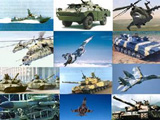|
|
TODAY.AZ / World news
Turkey refuses to expel Russia, China from defense competition
17 May 2011 [10:01] - TODAY.AZ
 Chinese and Russian companies eyeing Turkey’s multibillion-dollar program to acquire long-range missile and air defense will not be excluded from the contest despite Western criticism, Turkey’s procurement chief has said.
Chinese and Russian companies eyeing Turkey’s multibillion-dollar program to acquire long-range missile and air defense will not be excluded from the contest despite Western criticism, Turkey’s procurement chief has said.Western critics have claimed that the selection of either the Chinese or the Russian firm could compromise NATO’s intelligence and security procedures.
"The two systems [Russian and Chinese ones] will stay among our options; there’s no need to exclude them," Murad Bayar, the head of the Undersecretariat for Defense Industries, Turkey’s procurement agency, said.
Turkey’s choice on this large program is expected to be announced late this year or early next year. Bayar said Turkey would probably not issue a short list before its final decision is made.
One of the competing companies in the ongoing contest for Turkey’s national contract is the U.S. partnership between Raytheon and Lockheed Martin, with their Patriot Advanced Capability-3, or PAC-3, systems. Russia’s Rosoboronexport is marketing the S300 and S400 while China Precision Machinery Export-Import Corp., or CPMIEC, is offering its HQ-9. The Italian-French Eurosam, maker of the SAMP/T Aster 30, is also trying to market its product.
Some Western experts say that since the Russian and the Chinese systems are not compatible with NATO systems, their victory could provide them with access to classified NATO information, and as a result may endanger the alliance’s procedures.
"If, say, the Chinese win the competition, their systems will be in interaction, directly or indirectly, with NATO’s intelligence systems, and this may lead to the leak of critical NATO information to the Chinese, albeit inadvertently. So this is dangerous," one Western expert said.
"There are technical ways to prevent the Chinese and the Russians from getting access to NATO information, but this would drastically raise the price," the expert said. "One explanation is that Turkey itself doesn’t plan to select the Chinese or Russian alternatives, but is still retaining them among the options to put pressure on the Americans and the Europeans to curb their prices."
Turkish and NATO systems
Turkey’s long-range air and missile defense systems program, T-Loramids, has been designed to counter both enemy aircraft and missiles.
Separately, under a NATO plan approved during a summit meeting in Lisbon in November, the Western alliance will create a collective defense system against potential incoming ballistic missiles from rogue countries. Ankara agreed to the decision only after NATO accepted a Turkish request that Iran or other countries would not be specifically mentioned as potential sources of threat.
NATO now seeks to deploy special X-band radars in Turkish territory for early detection of missiles launched from the region.
Ideally, in the event of such a launch, U.S.-made SM-3 interceptors – based on U.S. Aegis destroyers to be deployed in the eastern Mediterranean and possibly in Romania – would then be fired to hit the incoming missile mid-flight.
Turkey’s national air defense system will be independent and separate from the NATO missile shield. But since both systems are, by nature, anti-ballistic missile schemes and both are supposed to protect Turkish soil, they will have to be integrated in some way.
The United States and some of its Western partners are opposed to the integration of any Russian or Chinese system into the NATO missile shield. "American officials already have said that non-NATO elements would cause serious interoperability problems," said one Turkish diplomat.
The governments of the competing companies are also involved in a diplomatic campaign to woo Turkey.
According to a release of highly classified U.S. diplomatic correspondences by the whistleblower website WikiLeaks, U.S. Defense Secretary Robert Gates has lobbied Turkish counterparts to select the U.S.-built PAC-3.
In a Feb. 16, 2010, cable sent to Washington by then-U.S. Ambassador to Ankara James Jeffrey, Gates was quoted as saying "nothing can compete with the PAC-3 when it comes to capabilities."
/Hurriyet Daily News/
URL: http://www.today.az/news/regions/86328.html
 Print version
Print version
Views: 1943
Connect with us. Get latest news and updates.
See Also
- 30 December 2025 [23:23]
JD.com and Huawei forge technology collaboration - 30 December 2025 [09:00]
China bans EV sliding handles from 2027 - 30 December 2025 [08:00]
Visa fraud cases increase in Germany - 29 December 2025 [23:24]
China cuts import duties from 2026 - 29 December 2025 [22:26]
Russia lower citizenship oath age to 14 - 29 December 2025 [20:21]
Cyprus assumes EU Council presidency from January 1 - 29 December 2025 [19:37]
Astana to launch unmanned taxis in 2026 - 29 December 2025 [11:04]
Russian Sputnik releases new year video depicting Putin gifting world leaders - 29 December 2025 [09:00]
Juventus wins 2-0 at promoted Pisa for its 3rd straight win in Serie A - 28 December 2025 [21:37]
Kevin Durant scores 30 points to lead Rockets to dominant win over Cavaliers
Most Popular
 The inconvenient truth: who actually owns the road through Meghri
The inconvenient truth: who actually owns the road through Meghri
 Azerbaijan sees weekly jump in gold prices
Azerbaijan sees weekly jump in gold prices
 Azerbaijan observes Lawyers' Professional Day
Azerbaijan observes Lawyers' Professional Day
 Jubilee event marking 75th anniversary of Professor Ibadulla Aghayev held in Baku
Jubilee event marking 75th anniversary of Professor Ibadulla Aghayev held in Baku
 Conference on civil defense work results held in Shamakhi
Conference on civil defense work results held in Shamakhi
 Kevin Durant scores 30 points to lead Rockets to dominant win over Cavaliers
Kevin Durant scores 30 points to lead Rockets to dominant win over Cavaliers
 Capacity building in assistive technology supports inclusive health [INTERVIEW]
Capacity building in assistive technology supports inclusive health [INTERVIEW]
